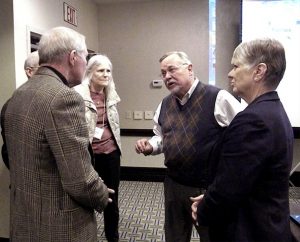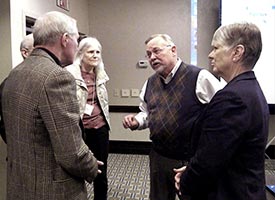By Joe Isenhower Jr.
ST. LOUIS — Concern for the need to recruit professional church workers for the future was a major point of discussion at the Feb. 7-8 LCMS Board for National Mission (BNM) meeting here.

The BNM also continued to fine-tune its policies to guide the Synod’s Office of National Mission (ONM); heard reports from a number of Synod-staff leaders; participated in a theological study for reaching postmodern, marginalized young adults; approved a step-by-step process for the board to call rostered workers into specialized pastoral ministries (for chaplaincies and other ministries related to the ONM); and took up the matter of filling board vacancies.
“The Synod needs to be very intentional and aggressive with recruiting for its next generation of church workers,” LCMS Chief Mission Officer Rev. Gregory K. Williamson told the BNM.
“We have [at least 280] active ministers over 70, and the days of huge groups of seminary graduates are gone,” Williamson said. “The real effect will come 10 years from now. … We must seek a robust pool of men and women for full-time church work,” he added, reminding the board that the concern is for future workers for commissioned positions, as well.
Williamson said that he and the Rev. Dr. Glen Thomas, executive director of LCMS Pastoral Education, had recently visited a number of LCMS high schools and colleges.
He related that during a visit to a high school to meet with those interested in church-work careers, “so many young people were interested that they had to give us a bigger room.
“I’m concerned about how we urge them on,” Williamson said. “If we don’t [engage] them when they’re interested, it’s difficult. But we have to start when they’re young. … The best poster persons for recruiting them are the resilient pastors and teachers in front of them.”
“They need to hear … it’s a good life,” BNM secretary Linda Stoterau responded, as LCMS First Vice-President Rev. Dr. Herbert C. Mueller added, “We need to recruit the brightest and the best.”
“Recruiting workers is everyone’s task in the church,” ONM Executive Director Rev. Bart Day said.
Day also spoke of one finding of the 2013 Youth Poll taken at last year’s National LCMS Youth Gathering, that young participants “have an interest in church work but are getting little or no encouragement.”
The Rev. Roosevelt Gray, the Synod’s new director of Black Ministry, reported to the board that the LCMS Black Clergy Caucus has resolved to establish a recruitment committee “that will help us specifically determine [how to best] recruit black church workers.”
Later in its meeting, the board decided to add wording about strengthening the need for church-work recruitment to several of its policies, including those for Black, Hispanic and other ethnic ministries.
And Director of LCMS School Ministry Terry Schmidt reminded board members in his report that “the future of our church is in Lutheran schools,” which are successful, in part, because “Lutheran schools [help] transform lives.”
“Lutheran schools partner with Christian families in the task of raising up the next generation of faithful Christian disciples,” one of Schmidt’s PowerPoint slides proclaimed.
In their reports, Schmidt and Gray, respectively, provided overviews of LCMS School Ministry and Black Ministry.
When asked by BNM Chairman Rev. Steven Briel about “the health of the Synod,” Williamson replied, “We’re doing fine. People in the LCMS are very generous, and we are intentional about being the best stewards that we can be.”
Williamson also spoke of the Synod’s “great progress in church relations, [especially with] potential new African partnerships among those who agree with LCMS stances” and the “good work” of Synod staff members.
The Rev. John Fale, associate executive director of LCMS Mercy Operations, also reported to the board, providing information for the board’s consideration of the specialized pastoral ministry call process.
For its theological study, the BNM heard from the Rev. Anthony “Tony” Cook, assistant professor of Practical Theology and associate dean of Curriculum and Instruction at Concordia Seminary, St. Louis.
Cook spoke of the challenges facing churches in reaching “a gigantic unchurched population” of the nation’s 80 million millennials (those who are 18 to 25 years old).
He cited a number of challenges in reaching many young people in that category who are known as “emerging adults” — challenges that surfaced from a study that resulted in the book, Lost in Translation: The Dark Side of Emerging Young Adults.
Those challenges are confused moral reasoning, routine intoxication, regrettable sexual experiences, materialistic life goals, and disengagement from civic and community life.
Cook said that typical millennials “don’t experience God in church,” and consider it “irrelevant, divisive and self-serving.”
But he added that, based on characteristics that millennials honor or need, a church for them is one that:
- focuses on Jesus and His teachings.
- connects to daily life.
- provides models of maturity and character.
- demonstrates love, mutual respect and unity.
- doesn’t compromise doctrine.
- provides supportive intergenerational community.
- addresses issues of equality and justice.
- serves community and world.
- allows diverse leadership and participation.
- listens to perspectives and allows discussion.
- utilizes the Internet as an educational platform.
- connects stewardship to mission, not administration.
Cook said that as the church works with millennials, “I don’t think we should capitulate to the culture. We need to serve God with our lips and our lives.”
“We need to present the living Lord Jesus Christ,” Vice-President Mueller added. “God is in the flesh and truly alive. That changes everything.”
“I believe that we need to focus on presenting our church in a way that our lips and lives are characterized by the kingdom of God,” Cook said. “Bring people in to live the narrative. Jesus made it clear that we are to be the salt and light in the world, to live it in our vocations. We have the practical solution to this — to be the church.”
The Youth Ministry 2014 symposium — sponsored by ONM Youth Ministry and held here Jan. 9-11 — concentrated on emerging adulthood. For the Reporter story about that event, click here.
Synod Secretary Rev. Dr. Raymond L. Hartwig recapped several recent opinions of the LCMS Commission on Constitutional Matters (CCM) for the BNM.
The board submits the policies it drafts to the CCM for its review. Policy development is the prime responsibility of both the BNM and the LCMS Board for International Mission.
Hartwig reminded the board that since “its primary interest [is] to work through districts,” the CCM recommended removing a number of references to “congregations” in policies, while noting that specific exceptions were made by the 2013 Synod convention. Later, the board spent considerable time editing policies in response to that recommendation.
Hartwig also answered a number of questions from board members about various other aspects of the BNM’s policy development since it was established in 2010 as part of the Synod’s sweeping restructure authorized by that year’s Synod convention.
“Just consider how far we’ve come with this,” he suggested. “I think we’ve come a long way. What I’ve seen is the kind of policies you should be addressing. … But it remains a work in progress.”
The Board for National Mission also decided to gather names for nominations to fill two vacancies on the board.
On Feb. 7, the BNM had dinner with leaders of the Lutheran Women’s Missionary League (LWML), who were meeting in the same hotel. Board members later expressed interest in continuing discussions with representatives of the LWML and Lutheran Hour Ministries (LHM), which are LCMS auxiliaries.
The next meeting of the LCMS Board for National Mission is slated for May 30-31 here — including a joint session with the Board for International Mission.
Updated Feb. 27, 2014
